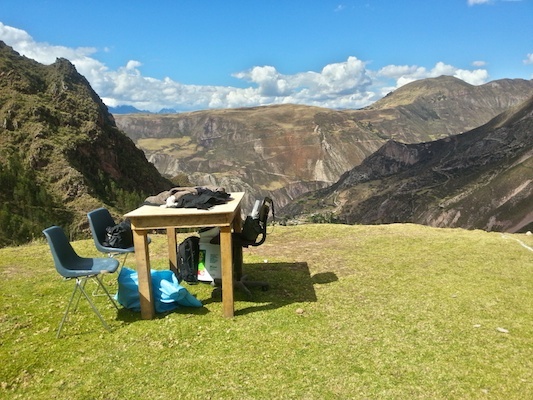We all fantasize about it, taking your job and shoving it, hopping on a plane, and heading out to see the world. But what keeps us from actually living out this fantasy?
I recently posed the question in a career break travel forum to better understand what was holding us back from making this fantasy real. Overwhelmingly the consensus was, "uncertainty of getting the same job/stability/income after returning."
This is no big surprise, we have been indoctrinated into the idea that we must not give up a good job and have a gap on our resume; it's too risky. We must work until retirement, and then we can travel and fulfill our personal desires. Veering from that path will leave you in a career abyss that you can't recover from, not to mention in debt. It's self-indulgent. It's irresponsible. It's career defeating.
Myth or Fact? Quitting Your Job to Travel Will Ruin Your Career
I was ready to take on this popular concern and figure out if career break doom and gloom is indeed a myth or fact. Do HR managers, recruiters, and prospective employers really mark a traveling career break as a read flag? Or is it what we tell ourselves to simply take the easier path and not make career changes? Can quitting your job to travel actually enhance your career path?
"I was gone for 11 months and hit 16 countries. I spent over 100 days underwater," says dive enthusiast Russ Brooks. He took a career break in 2011 at the age of 36. It took him 3 to 4 months to find new employment when he returned. Contrary to what our society says, he was indeed employable. Brooks went on to say, "Upon my return, The break definitely made me stand out to prospective employers, and put a spotlight on who I was and how I approached the world. Among other things, it showed that I was an independent thinker, willing to take risks to succeed, was self-confident and possessed a diversity of spirit. Nothing like a few stories of traveling in the developing world to show you can cope with anyone and any situation."
I was off to a good myth busting start, but before you resign and take off with your around the world ticket, consider some of these other things I discovered.
Use Your Break to Find Your Answers
How many times have you thought, "I'm lucky to have a job, so I shouldn't rock the boat." Many people stay in a job or career that they are unhappy with due to the fear of change, financial concerns, or having a gap on their resume. Many times they simply don't know what they want, so they stay. However for many professionals breaking away from a mediocre job, taking time away, seeing new cultures, and enhancing their international experience and soft skills was exactly what they needed to determine ultimately what it was they wanted to do in their career. By taking a career break and traveling you are able to overcome the paralysis of your current paycheck and title. Overwhelmingly when asked about the positive impacts of long term travel on a career path, I was pleasantly surprised to find out the most common noted benefit didn't dwell on titles or salary, most often they referred to the break furthering their career happiness and satisfaction.
" I make slightly less money, but I am so much more happy. Before the career break, I don't think I would have been able to give up my so-called "good" job to take a chance on something different," said medical professional Jordan Orofino who traveled for a year around the world. "The career break gave me the opportunity and courage to go after it."
More often than not, a career break gets your career back on the right track. Russ Brooks talked about how a travel break can align your core career values, "I think taking the break had a tremendous impact on my career. The break gave me time to unplug and recharge, see the world in an incredibly different light which allowed me the time step back and think about what was truly important to me, and when I returned, inspired me not to settle and to find work that matched my core values." After Brooks' sense of community was re-energized during his career break he came back to become the CEO of the startup, Urbanful.org, a social impact media company.
Career Break Travels Shouldn't be Hidden
To make your career break travels career enhancing you have to first let people know about it. Most everyone I talked to mentioned the extended travel on their resume and cover letter in some sort of capacity; some more prominently than others depending on their field.
Katie Aune, a former lawyer and alumni relations/development professional, left her fundraising job in 2011 to spend 13 months traveling and volunteering in all 15 countries of the former Soviet Union. She featured her travels on her resume as "International travel and education experience". She listed the countries she visited, her volunteer work, language studies, the travel blog she launched, and the freelance travel writing she did while on the road.
Heather Baker, an HR professional in Chicago, advises on how to best explain your career break, "How you tell your story can make the difference between whether you get the job or not. Many people are intrigued to hear about a sabbatical, but if you don't share the story in a way that is relevant, it can impact your job search. Think about this from the employer's point of view. They want to know your career path and how this career break fits into that. Include your sabbatical/career break on your resume. Share the relevant experience you gained as discussed above. Succinctly share the details of when and why you did the break as well as the outcome. If you are enthusiastic and upbeat about this time away, your passion will shine through and will excite your potential employers as well. Perhaps it will also trigger a relatable experience for them. "
Play up your uniqueness and stand out in a crowd of applicants
Hiring managers are looking for people who meet qualifications, but let's face it - with more people getting advanced degrees than ever, they normally have an abundance of applications to choose from, so it's necessary to find something that it going to make them think twice about putting you in the rejection pile. Your long-term travels make you unique.
As Heather indicated, often such a unique break and experience will stand out on a resume and get you noticed - in a good way.
"The department head I interviewed with had completed a 5-year break RTW on a sailboat. My travel experience was the first thing she asked about. I was hired for that job," replied Stacy Voorhees when asked about her job hunt after her career break.
Mitchel Samuelson was surprised by his interview experiences after his 6 month career break, "All the companies I interviewed with the first topic we discussed was my career break and traveling as it was either a common interest or they were envious and/or interested in where I'd gone."
Finally, Heather Baker has this advice for preparing for your return to the workplace and interviews with HR representatives like herself, "Your time away does not have to sabotage your job search if you focus on how it adds value to your personal brand and your future employer. You will be successful in finding that next job just be sure to do a bit of planning before and maintenance during your trip. And always be thinking about how you will share your story to your next employer."
Myth Busting
My conclusion in talking to numerous people who took the leap, got on a plane, and took a break - it helped their career in some way. Sometimes it provided them better opportunities in their career when they returned, and sometimes it provided more career clarity and satisfaction. Plus - as a side benefit they were also able to see the world before retirement. Out of the entire group of career break travelers I talked to, not one had a negative impact on their career. Some had more benefits than others, but overall it was positive. The myth was busted!
There will always be naysayers, but by taking these tips I discovered into account, you too can making your career break travels a career boost.
Now that you no longer have to worry about traveling being career defeating, you can start focusing on the next steps to taking your big career break leap. Bon Voyage!



